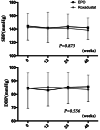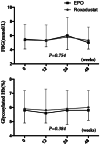Effect of roxadustat on lowering blood lipids in peritoneal dialysis patients with anemia
- PMID: 40000368
- PMCID: PMC11864003
- DOI: 10.1080/0886022X.2025.2460726
Effect of roxadustat on lowering blood lipids in peritoneal dialysis patients with anemia
Abstract
Objectives: To observe the effect of roxadustat on lowering blood lipids in peritoneal dialysis (PD) patients beyond treating anemia.
Methods: In a prospective, multicenter clinical study, we randomly assigned (in a 1:1 ratio) 100 PD patients who had received erythropoiesis-stimulating agent therapy for at least 4 weeks to receive either roxadustat or erythropoietin (EPO) for 48 weeks. The blood lipids, hemoglobin, blood pressure, blood glucose, iron metabolism and inflammatory factors were compared between the two groups at 0, 2, 4, 8, 12, 16, 20, 24 and 48 weeks, respectively.
Results: At start of switching to roxadustat, hemoglobin seemed to rise a little faster (102.8 ± 15.4 vs. 97.1 ± 17.3 g/L at 2 weeks, p > 0.05), but there was no significant difference in hemoglobin change between the two groups over the course of observation (p = 0.185). At the early stage of the study (12 weeks), the transferrin saturation (TSAT) of roxadustat group decreased significantly from the baseline (32.7 (20.6) vs. 22.1 (18.7)%, p = 0.001). At the end of the study period (48 weeks), total cholesterol (3.89 ± 0.92 vs. 4.52 ± 1.14 mmol/L, p = 0.012), low density lipoprotein cholesterol (2.24 ± 0.74 vs. 2.63 ± 0.82 mmol/L, p = 0.045) and triglyceride (1.35 (0.86) vs. 1.89 (1.27) mmol/l, p = 0.013) in roxadustat group were significantly lower than those in EPO group.
Conclusions: Roxadustat not only can improve anemia and iron metabolism, but also can reduce serum cholesterol and triglyceride levels in PD patients after switching from the EPO.
Keywords: Roxadustat; anemia; blood lipids; iron metabolism; peritoneal dialysis.
Conflict of interest statement
No potential conflict of interest was reported by the author(s).
Figures










Similar articles
-
A retrospective study on the efficacy of Roxadustat in peritoneal dialysis patients with erythropoietin hyporesponsiveness.Korean J Intern Med. 2024 May;39(3):488-500. doi: 10.3904/kjim.2023.520. Epub 2024 Apr 23. Korean J Intern Med. 2024. PMID: 38649158 Free PMC article.
-
Roxadustat Treatment for Anemia in Patients Undergoing Long-Term Dialysis.N Engl J Med. 2019 Sep 12;381(11):1011-1022. doi: 10.1056/NEJMoa1901713. Epub 2019 Jul 24. N Engl J Med. 2019. PMID: 31340116 Clinical Trial.
-
A Prospective, Self-Controlled Pilot Study of the Efficacy of Roxadustat for Erythropoietin Hyporesponsiveness in Patients Requiring Chronic Ambulatory Peritoneal Dialysis.J Ren Nutr. 2022 Sep;32(5):595-604. doi: 10.1053/j.jrn.2021.09.003. Epub 2021 Oct 29. J Ren Nutr. 2022. PMID: 34756787 Clinical Trial.
-
Roxadustat for the treatment of anemia in patients with chronic kidney diseases: a meta-analysis.Aging (Albany NY). 2021 Jun 11;13(13):17914-17929. doi: 10.18632/aging.203143. Epub 2021 Jun 11. Aging (Albany NY). 2021. PMID: 34115611 Free PMC article.
-
The efficacy and safety of roxadustat for anemia in patients with dialysis-dependent chronic kidney disease: a systematic review and meta-analysis.Ren Fail. 2023 Dec;45(1):2195011. doi: 10.1080/0886022X.2023.2195011. Ren Fail. 2023. PMID: 37489561 Free PMC article.
References
-
- Baigent C, Landray MJ, Reith C, et al. . The effects of lowering LDL cholesterol with simvastatin plus ezetimibe in patients with chronic kidney disease (Study of Heart and Renal Protection): a randomised placebo-controlled trial. Lancet. 2011;377(9784):2181–2192. doi: 10.1016/S0140-6736(11)60739-3. - DOI - PMC - PubMed
Publication types
MeSH terms
Substances
LinkOut - more resources
Full Text Sources
Medical
Research Materials
